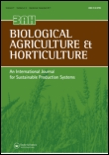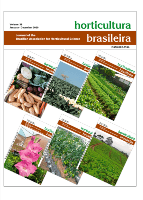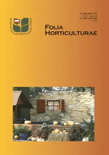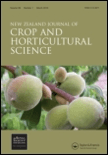
Journal of Horticultural Sciences
metrics 2024
Exploring Innovations in Plant Science and Ecology.
Introduction
The Journal of Horticultural Sciences, published by the Society for Promotion of Horticulture (SPH) in India, serves as a vital platform for the dissemination of research in horticulture and related fields. With an ISSN of 0973-354X and an E-ISSN of 2582-4899, this open-access journal has been committed to advancing horticultural knowledge since 2006, allowing researchers to share their findings widely and facilitate significant advancements in the discipline. The journal's influence is reflected in its current category quartile rankings, designated as Q4 in Ecology, Evolution, Behavior and Systematics, Horticulture, and Plant Science for 2023, illustrating its developing reputation within the academic community. It is important to note the journal's Scopus ranking in the field, where it ranks #111 in Horticulture and #709 in Ecology, marking it as a niche publication with potential for growth. As it converges years from 2019 to 2024, this journal aims to further engage scholars, professionals, and students by focusing on innovative research and breakthroughs in horticultural sciences, thus contributing to the global discourse in sustainable agriculture and environmental stewardship.
Metrics 2024
 0.13
0.13 0.20
0.20 -
- 4
4Metrics History
Rank 2024
Scopus
IF (Web Of Science)
JCI (Web Of Science)
Quartile History
Similar Journals

JOURNAL OF HORTICULTURAL SCIENCE & BIOTECHNOLOGY
Advancing horticultural innovation through cutting-edge research.JOURNAL OF HORTICULTURAL SCIENCE & BIOTECHNOLOGY, published by Taylor & Francis Ltd, stands as a prestigious platform in the realms of both horticulture and biotechnology. With an ISSN of 1462-0316 and an E-ISSN of 2380-4084, this journal showcases cutting-edge research that advances our understanding of plant science and genetic innovation. Operating under the publication umbrella from 1996 to 2024, the journal has achieved notable rankings, placing in the Q3 quartile for Genetics and Q2 for Horticulture in 2023. With a Scopus ranking of #25/115 in Agricultural and Biological Sciences (Horticulture) and a respectable 78th percentile, it is highly regarded among researchers and professionals alike. While currently not designated as Open Access, the journal remains crucial for academics keen on disseminating groundbreaking findings and techniques that foster advancements in agricultural productivity and sustainability. As an essential resource for researchers, professionals, and students, JOURNAL OF HORTICULTURAL SCIENCE & BIOTECHNOLOGY not only facilitates knowledge sharing within its community but also serves as a vital reference point for future innovations in the field.

BIOLOGICAL AGRICULTURE & HORTICULTURE
Nurturing knowledge for a greener tomorrow.Biological Agriculture & Horticulture, published by Taylor & Francis Ltd, stands as a pivotal journal in the realms of agronomy and horticultural sciences. With an ISSN of 0144-8765 and an E-ISSN of 2165-0616, this esteemed journal has been disseminating vital research since its inception in 1982 and continues to publish leading studies through 2024. It currently boasts a commendable Q2 quartile ranking in both Agronomy and Crop Science as well as Horticulture, placing it in a prominent position within the academic community. With Scopus rankings indicating a 70th percentile in Horticulture and a 62nd percentile in Agronomy and Crop Science, the journal is a key resource for researchers, professionals, and students focused on innovative practices and scientific advancements in biological agriculture. While the journal is not open access, it remains an invaluable repository for cutting-edge research, methodologies, and reviews that push the boundaries of agricultural and horticultural sciences.

INDIAN JOURNAL OF AGRICULTURAL SCIENCES
Empowering research to enhance food security.Welcome to the Indian Journal of Agricultural Sciences, a vital resource for researchers and professionals in the field of agricultural sciences, published by the esteemed Indian Council of Agricultural Research. Established in 1974, this journal aims to disseminate high-quality research and developments in agronomy and crop science, facilitating knowledge exchange and advancement within the agricultural community. Though currently classified in the Q4 category according to 2023 data, it provides an essential platform for publication, contributing valuable insights towards sustainable agricultural practices. With an ISSN of 0019-5022 and an E-ISSN of 2394-3319, the journal houses important research that spans decades of convergence and collaboration, promoting innovation in agriculture across India and beyond. As an open access platform, it invites contributions that reflect a wide array of agricultural disciplines to foster sustainable food systems that address the challenges of food security. Join the network of scholars and practitioners by sharing your research and engaging with the profound work being done in this transformative field.

Horticultura Brasileira
Empowering researchers to grow the field of horticulture.Horticultura Brasileira is a leading open access journal published by the ASSOC BRASILEIRA HORTICULTURA, dedicated to advancing research in the fields of horticulture, plant science, and soil science. With an ISSN of 0102-0536 and an E-ISSN of 1806-9991, this journal has been an integral part of the scientific community since its inception, embracing open access practices since 1999. Based in Brazil, it provides a platform for researchers to disseminate their findings and contribute to the growing body of knowledge in horticultural science and related disciplines. Despite its current Q3 ranking in multiple categories such as Horticulture, Plant Science, and Soil Science within Scopus, the journal continues to attract a diverse array of scholarly articles, fostering innovation and collaboration among scientists. The journal aims to bridge the gap between research and practical applications, making it an invaluable resource for students, professionals, and academics alike who are looking to expand their understanding and impact in the field.

Folia Horticulturae
Cultivating Knowledge, Growing Innovation.Folia Horticulturae, an esteemed journal in the field of Horticulture, serves as a pivotal platform for the dissemination of innovative research and developments within agricultural and biological sciences. Published by SCIENDO, this open-access journal has been contributing to the global scientific community since 2004, ensuring that key findings are freely accessible to researchers, professionals, and students alike. Based in Poland, the journal boasts an impressive Q2 ranking in Horticulture, indicating its solid impact and significance in the field, with a Scopus rank of #32 out of 115, placing it in the 72nd percentile. With a commitment to fostering scientific discourse, Folia Horticulturae actively encourages contributions that explore various aspects of horticultural science, from crop management to sustainability practices. This initiative not only enhances knowledge but also advances practical applications, making it an invaluable resource for anyone interested in the intricacies of horticulture.

Ornamental Horticulture-Revista Brasileira de Horticultura Ornamental
Transforming Landscapes through Scientific InquiryOrnamental Horticulture - Revista Brasileira de Horticultura Ornamental, published by the SOC BRASILEIRA FLORICULTURA & PLANTAS ORNAMENTAIS, serves as a premier platform for disseminating high-quality research in the field of ornamental horticulture. With an Open Access model in place since 1995, this journal ensures that valuable findings in horticultural science reach a wide audience, fostering greater collaboration within the global community. Based in Brazil, this journal primarily focuses on the cultivation, management, and improvement of ornamental plants, contributing significantly to both the scientific and practical aspects of the horticulture industry. It has achieved esteemed rankings, including being classified in the Q2 quartile for Horticulture and Q3 for Plant Science in 2023, demonstrating its academic rigor and relevance. Scopus ranks it at 54th in Horticulture and 278th in Plant Science, positioning it among leading scholarly resources in these fields. The journal is committed to advancing knowledge through innovative research that aids in the sustainable development of ornamental horticulture practices.

NEW ZEALAND JOURNAL OF CROP AND HORTICULTURAL SCIENCE
Empowering Researchers in Plant Sciences and BeyondThe New Zealand Journal of Crop and Horticultural Science, published by Taylor & Francis Ltd, stands as a key resource in the fields of Agronomy and Horticulture, with a commendable impact factor reflecting its quality and influence in the scientific community. Since its inception in 1989, this journal has been committed to advancing our understanding of crop development and horticultural practices, catering not only to researchers and professionals but also to students eager to delve into the intricacies of plant sciences. With a Q3 ranking in both Agronomy and Crop Science and Horticulture as of 2023, the journal occupies a significant position within the agricultural and biological sciences domain, significantly contributing to the body of knowledge in these fields. The journal features original research, reviews, and technical notes that cover a wide range of topics, ensuring a comprehensive perspective on contemporary and emerging agricultural issues. For individuals interested in accessing cutting-edge research, the journal provides subscription-based access, further enhancing its scholarly contributions.

Scientific Papers-Series B-Horticulture
Cultivating Knowledge, Growing Futures.Scientific Papers-Series B-Horticulture is a distinguished open-access journal published by the University of Agronomic Sciences and Veterinary Medicine Bucharest. With its ISSN 2285-5653 and E-ISSN 2286-1580, this journal has been accessible to the global research community since 2002, ensuring that vital horticultural research reaches a wide audience without barriers. Positioned at the forefront of the horticultural sciences, the journal serves as a platform for original research, reviews, and innovations pertaining to horticultural practices, plant physiology, and sustainable agriculture. Its contributions are not just significant in Romania but also resonate through the international scientific community, helping to address pressing agricultural challenges. The office located at 59 Marasti Boulevard, District 1, Bucharest 011464, Romania, symbolizes its commitment to advancing horticultural knowledge and fostering collaboration among researchers, professionals, and students alike. With no current H-index data, the journal invites continued contributions to enhance its visibility and impact in the field.

Acta Scientiarum Polonorum-Hortorum Cultus
Exploring Sustainable Practices in Horticulture.Acta Scientiarum Polonorum-Hortorum Cultus is a notable open-access journal dedicated to the field of horticultural science, published by UNIV LIFE SCIENCES LUBLIN in Poland. Since its inception in 2002, it has aimed to disseminate high-quality research findings, innovative methodologies, and advancements in the horticultural sector. The journal is indexed in Scopus and has ranked in the 33rd percentile for Horticulture and the 25th percentile for Plant Science, indicating its growing influence and relevance within the scientific community. Despite the challenges presented in quartile categorizations, Acta Scientiarum Polonorum maintains a commitment to cultivating knowledge and fostering collaboration among researchers, professionals, and students in the agricultural and biological sciences. With its publication timelines spanning from 2008 to 2024, the journal serves as a vital resource for those interested in the latest horticultural trends, sustainable practices, and scientific inquiries that drive the field forward.

Molecular Horticulture
Enhancing Crop Production with Molecular PrecisionMolecular Horticulture is a prestigious journal published by SpringerNature, dedicated to advancing knowledge in the fields of Agronomy, Crop Science, Horticulture, and Molecular Biology. Based in the United Kingdom, this journal, with ISSN 2730-9401, is recognized for its high-quality, peer-reviewed research and has rapidly established itself within the academic community, achieving a remarkable Q1 ranking across its relevant categories as of 2023. With a strong focus on innovative research that explores the intersection of molecular biology and horticultural science, Molecular Horticulture provides valuable insights that are essential for researchers and professionals aiming to enhance crop production and sustainability practices. As part of the Scopus database, the journal ranks impressively within its fields, holding notable positions such as Rank #7 in Horticulture and Rank #42 in Agronomy and Crop Science. While currently published through traditional access models, the journal remains accessible to a wide audience of scientists, educators, and students eager to stay informed on the latest discoveries and trends in plant science.